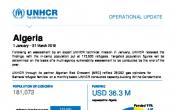Algeria
Operation: Algeria
Location
{"longitude":3,"latitude":27,"zoom_level":5,"iso_codes":"'DZA'"}
By clicking on the icons on the map, additional information is displayed.
Key Figures
| 2017 year-end results | |
| 100% | of refugees had access to primary health care |
| 31,900 | refugee children in Tindouf camps were enrolled in primaryschool |
| 58 | community or business projects were supported, reaching more than 200 young refugees |
| 42 | refugees from 13 different nationalities had their cases submitted for resettlement, 50 refugees departed to a resettlement country |
| 2018 planning figures | |
| 100% | of Sahrawi refugees will have access to primary health care |
| 100% | of refugee children will be enrolled in primary and secondary education in Tindouf camps |
| 3,000 | metres of water pipelines will be laid in Tindouf camps to reach the target of an average quantity of 20 litres/person/day |
| 3,000 | shelters will be provided in Tindouf camps |
| 300 | Sahrawi refugees will receive entrepreneurship or business training |
| 200 | Sahrawi refugees will be supported with vocational training |
| 20 | urban refugees and asylum-seekers will be assisted with a durable solutions in a third country |
People of Concern
1%
Decrease in
2016
2016
| 2016 | 99,949 |
| 2015 | 100,775 |
| 2014 | 99,005 |

[["Refugees",94232],["Asylum-seekers",5712],["Returned refugees",5]]
Loading ...
Algeria
< Back
2017
{"categories":[2013,2014,2015,2016,2017,2018],"budget":[28.17015775,32.70824967,33.227035854,28.96476598,36.540225984,36.25605293],"expenditure":[15.08854711,14.41533372,16.01047015,16.14724515,15.47144188,null]}
{"categories":[2013,2014,2015,2016,2017,2018],"p1":[28.17015775,32.70824967,33.227035854,28.96476598,36.540225984,36.25605293],"p2":[null,null,null,null,null,null],"p3":[null,null,null,null,null,null],"p4":[null,null,null,null,null,null]}
{"categories":[2013,2014,2015,2016,2017,2018],"p1":[15.08854711,14.41533372,16.01047015,16.14724515,15.47144188,null],"p2":[null,null,null,null,null,null],"p3":[null,null,null,null,null,null],"p4":[null,null,null,null,null,null]}
Loading ...
CHOOSE A YEAR
- 2014
- 2015
- 2016
- 2017
- 2018
Operational context
In Algiers, UNHCR continued to register asylum-seekers to conduct refugee status determination (RSD) and to provide assistance to the most vulnerable refugees. Several deportation operations took place in 2017, including of a small number of people of concern to UNHCR. Since August 2017, NGOs have reported the deportation of more than 3,000 sub-Saharan Africans to Niger without an opportunity to challenge their expulsion. UNHCR advocated for the release of 12 refugees and asylum-seekers who had been included in the deportations. Apart from the Tindouf operation in the south, UNHCR’s scope of intervention is limited to Algiers province, due to security restrictions.UNHCR and partners provided protection and humanitarian assistance to 90,000 most vulnerable refugees from Western Sahara living in camps near Tindouf. Funding shortfalls directly impacted the delivery of lifesaving assistance, including food assistance.
Population trends
In 2017, more than 6,600 people of concern were registered with UNHCR, of whom some 5,830 were from Syrian Arab Republic and 160 from Yemen. Other countries of origin included Cameroon, Côte d’Ivoire, the Central African Republic, the Democratic Republic of the Congo Iraq, Libya and Palestine. There were 206 newly registered sub-Saharan asylum-seekers and 253 refugees recognized by UNHCR.Key achievements
- In Algiers, UNHCR continued to provide assistance, including shelter, health, psychological, food and cash grants, and to carry out protection activities such as registration, RSD, and legal support to urban refugees and asylum-seekers. With the aim to support the establishment of a national asylum system, UNHCR organized regular sensitization, capacity-building and coordination initiatives for local government and civil society actors.
- In Tindouf, UNHCR continued to support the Sahrawi health care system, providing equipment, supplies, medicines and support to health workers to carry out lifesaving activities.
- UNHCR supported a safe house to accommodate women in Tindouf.
- UNHCR provided shelter support (family tents) to more than 3,320 Sahrawi refugee families in Tindouf, and during eight months, UNHCR provided fuel for heating and cooking to 28,000 families each month.
Unmet needs
Algiers- Essential needs were not covered for the most vulnerable registered urban refugees and asylum-seekers.
- The amount of water provided per person per day in Tindouf camps remains below UNHCR’s standard of 20 litres, at 18 litres. In order to reach the standard, the construction of three new boreholes, strengthening the water treatment system, installing a treatment system in one camp, and establishing two decentralized workshops for the management of water trucks in two camps would be required.
- In Tindouf, only 70 per cent of needs related to laboratories and X-rays were covered, while health infrastructure needs to be rehabilitated and newly equipped. Only 20 per cent of required basic medicines were received in 2017.
- In order to guarantee a safe learning environment for students in Tindouf, 24 schools need to be reconstructed along with libraries, laboratories and recreational and sports facilities that need to be constructed.
Working environment
In Algeria, UNHCR, together with partners, protects and assists some 7,000 refugees and asylum-seekers in urban areas, the majority of which are Syrians. An additional 90,000 vulnerable refugees from Western Sahara are sheltered in five camps near Tindouf, Algeria.Refugees and asylum seekers in camps, and urban environments alike, are given free access to medical services and education by the authorities.
Key priorities
In 2017 the operation will focus on:• Carrying out registration, refugee status determination, essential assistance, and resettlement activities for urban refugees and asylum seekers;
• Continuing its care and maintenance activities for refugees from Western Sahara;
• Expanding livelihoods activities to reduce vulnerabilities and improve living conditions in camps;
• Advocating for the adoption of a national refugee legislation;
• Expanding the protection space, notably outside of Algiers.
Funding shortfalls in 2017 will impact UNHCR’s ability to finance long-term investment to reduce costs, notably in terms of water production, as the current funding levels are already making it difficult to reach minimum standards in the camps. Moreover, efforts to develop livelihoods opportunities and therefore reduce refugees’ dependence on humanitarian assistance would also run the risk of being curtailed.
